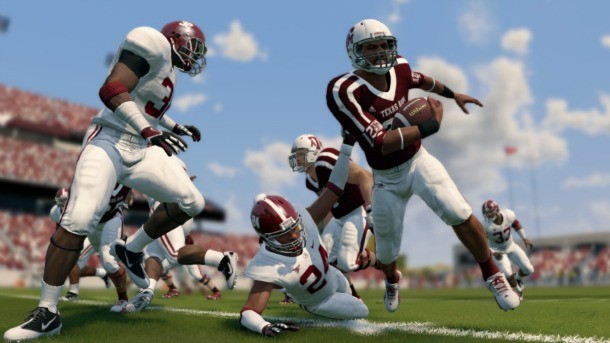The Continuing Legal Moves That Ensnare College-Sports Video Games

NCAA's March Madness men's basketball tournament has just started up, but there's another court that's also getting attention for the association. A three-judge panel from the 9th U.S. Circuit of Appeals heard oral arguments yesterday in the NCAA's appeal of a ruling last fall that said that student athletes should be compensated for their names, images, and likenesses appearing in video games, live broadcasts, and rebroadcasts. While EA has shut down its college franchises and already settled for multi-millions with plaintiffs, these latest legal developments make the return of these games even more difficult.
The Matter At Hand
The case at the heart of this – O'Bannon v. NCAA – is a class-action, antitrust lawsuit filed by former UCLA basketball player Ed O'Bannon that seeks no money, but aims to overturn the NCAA's long-standing policy of not paying student athletes for use of their names, images, and likenesses (NIL) in commercial endeavors such as video games.
In August of last year, U.S. District Court Judge Claudia Wilken issued an injunction that effectively decided that athletes in Division 1 Football Bowl Subdivision (formerly Division 1-A football) and D1 men's basketball should be paid at least $5,000 a year while they are in school, to a trust fund not accessible until they graduate or their eligibility expires.
The NCAA is currently appealing Judge Wilken's decision and says that it will take matters to the Supreme Court if necessary. At stake for the NCAA is the association's cornerstone belief that "student athletes" should not be paid, and thus should not be included in the billions of dollars the NCAA makes off of college athletics.
How Is This Important To Video Games?
Electronic Arts – the last game company to produce NCAA-licensed titles for college sports – decided to shut down its NCAA college football franchise (even after contemplating continuing without the NCAA license) in 2013, and settled with plaintiffs (including O'Bannon and those from other cases) for more than $40 million. Interestingly, the judges on the current appeals panel are the same as those who ruled that EA was not protected from using player likenesses by the First Amendment in a separate case involving former Nebraska and Arizona State QB Sam Keller.
EA COO Peter Moore told us last year that while EA wouldn't rule out a return to collegiate video game sports, they were at the mercy of the larger legal situation and the new economic realities it would likely impose on any such development.
Should Wilken's injunction stand and players need to be compensated, EA or any other video game company's return to the field would be greatly complicated. Creating a college-football game in a world where athletes must be compensated for use of their name, etc. (and without the luxury of being able to infer their presence like before) could be very expensive – and there is still the matter of garnering the appropriate school and bowl licenses. For EA in particular this is harder given that the licensing partnership between it and the NCAA two dissolved amid lawsuits.
In a Bloomberg article, Marc Edelmen, sports law and antitrust professor at Baruch College, points out that Wilken's injunction may require the NCAA to compensate players, but it wouldn't require conferences to do so – another example of the complicated landscape that college video games face.
What Happens Next?
Now that the three-judge panel has heard oral arguments from both sides, there is no specific timetable for its final decision. Should the NCAA lose this appeal, it could take matters to a full panel of judges and the Supreme Court. Judge Wilken's decision, however, effectively kicks in August 1, which is the first day that money to players' funds can first be administered.

Get the Game Informer Print Edition!
Explore your favorite games in premium print format, delivered to your door.
- 10 issues per year
- Only $4.80 per issue
- Full digital magazine archive access
- Since 1991








